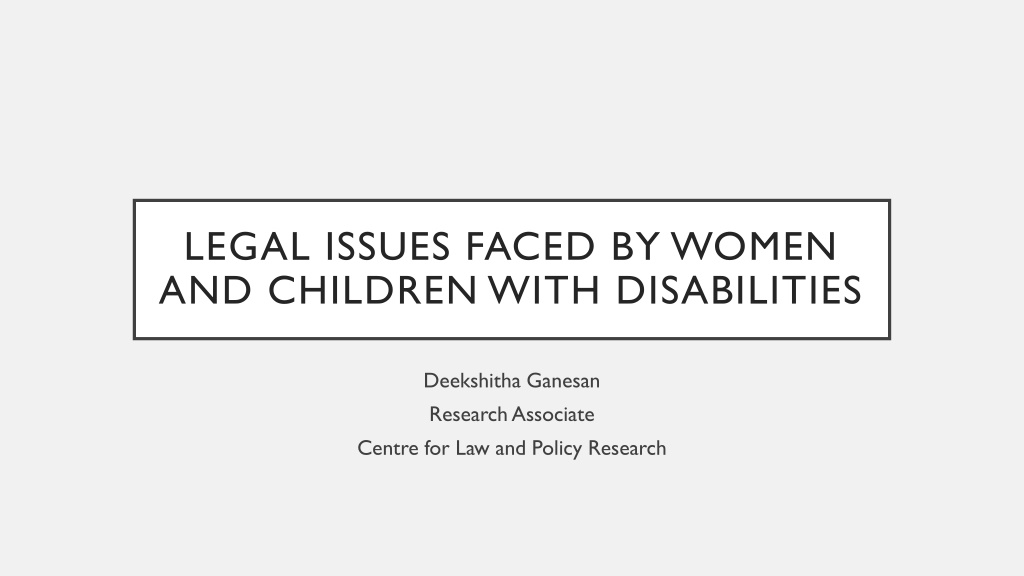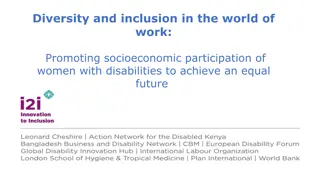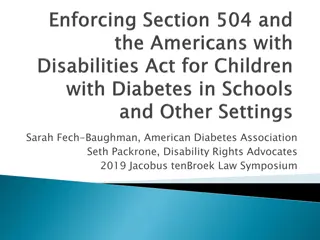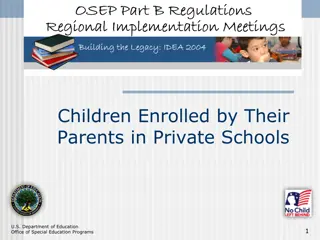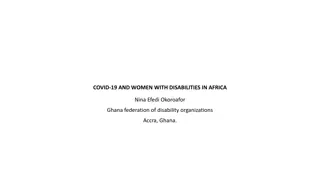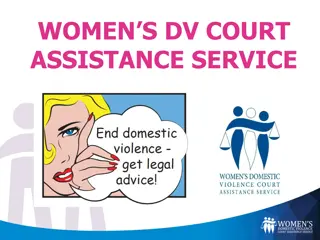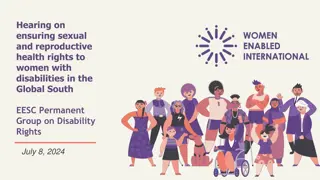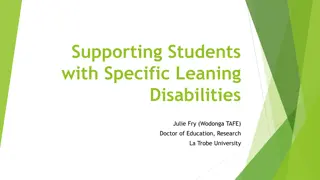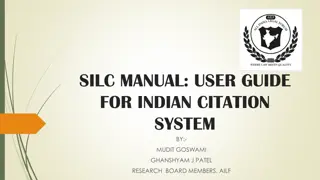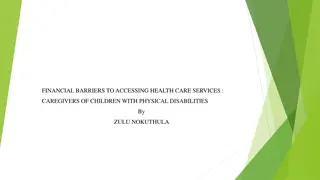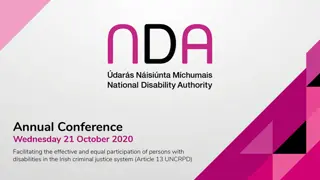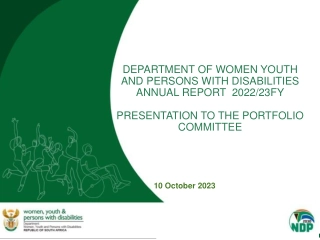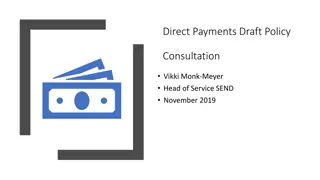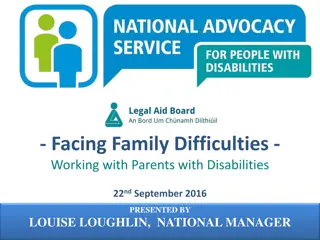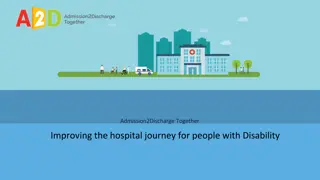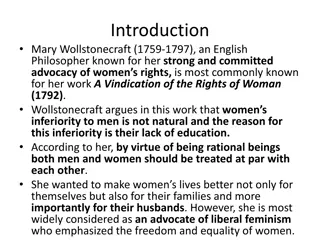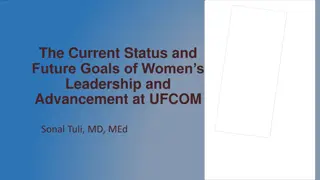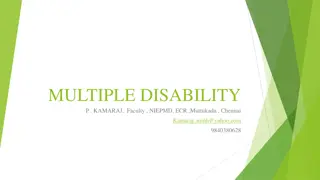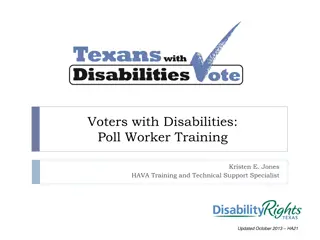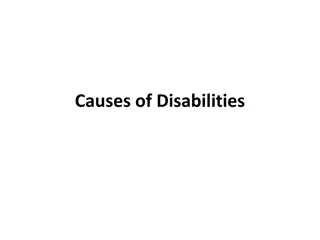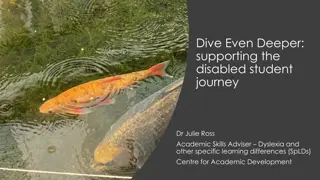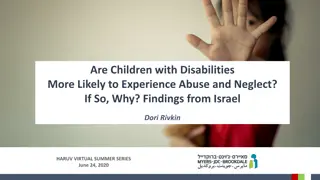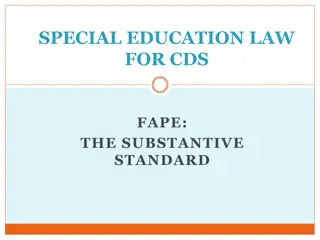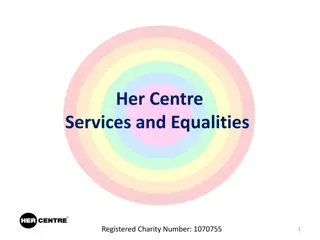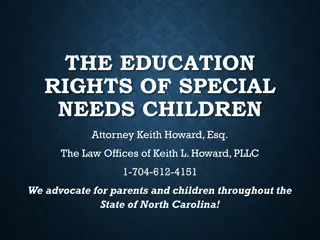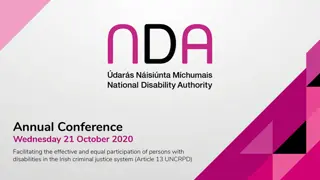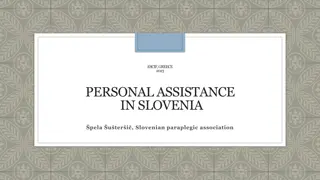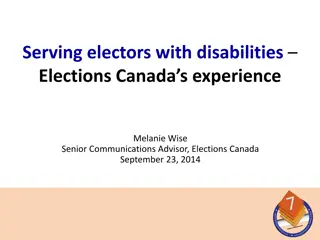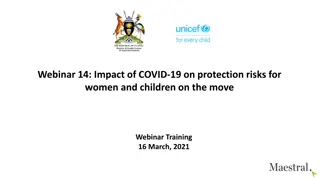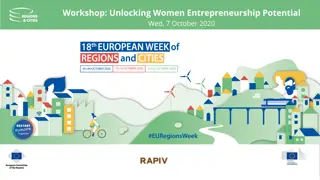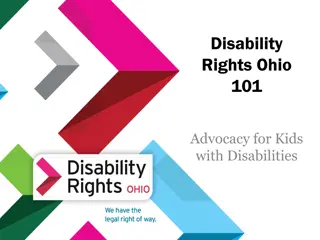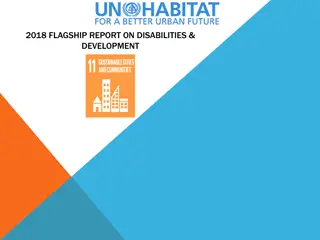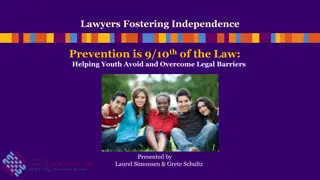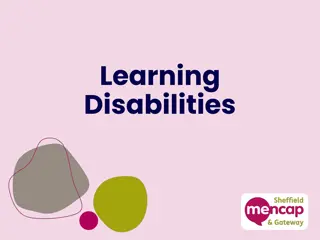Legal Issues Faced by Women and Children with Disabilities in India
Women and children with disabilities in India face various legal challenges related to rights recognition, access to healthcare, protection from violence, and employment opportunities. The Indian Constitution acknowledges the rights of persons with disabilities under Articles 14 and 21, while also emphasizing the importance of equality and free legal aid. However, women and children with disabilities are more vulnerable to overcrowding, lack of hygiene, and violence. Specific legal issues include inadequate access to healthcare, forced treatments, sexual violence, and unequal opportunities in employment. Measures like the Rights of Persons with Disabilities Act, 2016 aim to address these issues but more comprehensive guidelines are needed.
Uploaded on Sep 27, 2024 | 0 Views
Download Presentation

Please find below an Image/Link to download the presentation.
The content on the website is provided AS IS for your information and personal use only. It may not be sold, licensed, or shared on other websites without obtaining consent from the author. Download presentation by click this link. If you encounter any issues during the download, it is possible that the publisher has removed the file from their server.
E N D
Presentation Transcript
LEGAL ISSUES FACED BY WOMEN AND CHILDREN WITH DISABILITIES Deekshitha Ganesan Research Associate Centre for Law and Policy Research
RIGHTS OF PERSONS WITH DISABILITIES UNDER THE INDIAN CONSTITUTION Fundamental Rights (a) Supreme Court has recognised rights of persons with disabilities under Articles 14 (right to equality) and 21 (right to life) (b) Article 15(3) Enact special measures in favour of women and children Directive Principles of State Policy (a) Article 39A State shall secure the operation of the legal system on the basis of equal opportunity and shall provide free legal aid to ensure that opportunities for securing justice are not denied to any citizen by reason of economic or other disabilities (b) Article 41 State shall make effective provision for securing the right to work, to education and to public assistance in cases of unemployment, old age, sickness and disablement.
WOMEN AND CHILDREN WITH DISABILITIES ARE MORE VULNERABLE Women and children with disabilities are in a unique position of disadvantage HRW study on women with psycho-social disability where women and girls with psychosocial or intellectual disabilities experience overcrowding and lack of hygiene, inadequate access to general healthcare, forced treatment including electroconvulsive therapy as well as physical, verbal, and sexual violence. Rights of Persons with Disabilities Act, 2016 provide a limited gender component. For eg. sexual and reproductive rights of women have been recognised but no clear guidelines on how they may be realised. Violence against women Sexual violence Greater risk of sexual violence; violence against minor girls with disabilities in shelter homes in many states Domestic violence Protection of Women from Domestic Violence Act, 2005 Forced marriages
GENERAL LEGAL ISSUES WOMEN WITH DISABILITIES Women and children with disabilities can enjoy rights equally with others Section 4 Basic schemes under the Act which apply to women and children: (a) Disability Certificate can be obtained from the nearest Government hospital or other notified medical authority (b) Disability identity card online application process Employment Vocational training and self-employment Section 19 Reservations in public employment Section 34 Incentives to private employers Section 35 While specific reservations are provided for various categories of persons with disabilities, no such special reservations provided for women with disabilities women with disabilities faced unequal hiring standards, unequal pay, lack of access to training Rebate on interest on micro-credit from National Handicapped Finance and Development Corporation Access Judicial institutions For eg. women with visual impairment face physical barriers and barriers in terms of consuming information and interpreting signs particularly as women with disability are at risk of sexual violence Public toilets For eg. not suitable for women with locomotor disability
SPECIFIC LEGAL ISSUES WOMEN WITH DISABILITIES Schemes in favour of persons with benchmark disabilities Section 37 5% reservation in allotment of agricultural land, housing schemes, poverty alleviation and development schemes with priority to women with disabilities Sexual and Reproductive Rights State to take necessary measures to provide access to sexual and reproductive healthcare for women with disability - Section 25 Women with disabilities are at the risk of undergoing forced medical procedures without informed consent 2016 Act recognises legal capacity of persons with disabilities (Section 13) and specifically talks about (i) ensuring that persons with disabilities have access to appropriate information on reproductive and family planning (ii) no persons with disability will be subject to medical procedures which leads to infertility without informed consent (Section 10) Medical Termination of Pregnancy Act, 1971 Consent of woman paramount for abortion, except where suffers from mental illness Mental illness v. Mental Retardation Mental Retardation condition of arrested or incomplete development of mind of a person which is specially characterised by sub-normality of intelligence (Section 2(g) of National Trust for Welfare of Persons with Autism, Cerebral Palsy, Mental Retardation and Multiple Disabilities Act, 1999)
LEGAL ISSUES CHILDREN WITH DISABILITIES Section 4 All children with disabilities shall have the right to freely express their views on matters affecting them Section 9 No child with disability shall be separated from his or her parents on the ground of disability except on the order of a court and in the best interests of the child Where parents are unable to take care of the child, the Court may place such child with near relations, within the community in a family setting and in exceptional cases, in Government or NGO run shelter homes Special Schemes / Provisions Section 24 - Government shall formulate schemes to enable persons with disabilities to live independently or in the community. For eg. facilities for children with disabilities who have no family or have been abandoned or are without shelter and livelihood Section 25 -Appropriate government to provide free health care, barrier free access and shall screen all children with disabilities at least once in a year to identify at risk cases
LEGAL ISSUES CHILDREN WITH DISABILITY Education Section 31 Every child with benchmark disabilities between 6-18 years shall have the right to free legal education Section 16 All Government and Government aided educational institutions shall provide inclusive education Admit without discrimination Accessible facilities Reasonable accommodation of individual s needs Provide transportation facilities Detect learning disabilities Section 17 Obligation of Government to provide training to teaching staff, provide books, learning materials and assisted devices free of cost until 18 years and scholarships to students with benchmark disabilities Section 32 Reservations in higher education of 5% Section 42 Make available all audio, print and electronic content in accessible format for persons with disabilities (CLPR is in the process of filing a PIL to enforce this provision)
LEGAL ISSUES CHILDREN WITH DISABILITIES Juvenile Justice Act, 2016 Section 2(14) Mentally ill, mentally/physically challenged children and children suffering from a terminal or incurable disease covered under definition of child in need of care and protection Section 3 No discrimination against children on the basis of disability in the implementation of the provisions of the statute, For eg. on rehabilitation and adoption of children with disabilities Legal capacity and Guardianship For children with psycho-social disabilities, after they attain the age of majority, parents may take formal legal guardianship of their children Section 14 Provision for guardianship of persons with disabilities who are unable to take legally binding decisions Sexual violence Sexual offences against children with disabilities are punishable under the Protection of Children from Sexual Offences Act, 2012 aggravated sexual assault punishable with imprisonment of not less than less 10 years up to life and fine (Section 5, 6)
